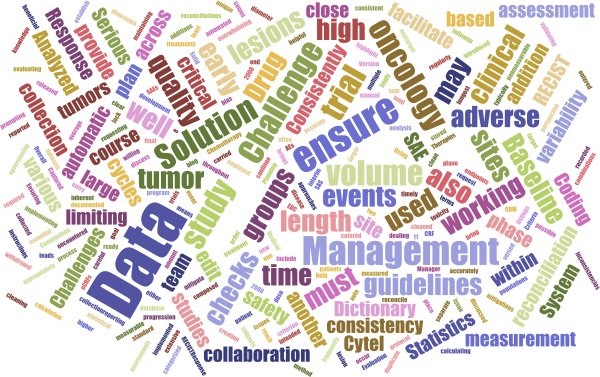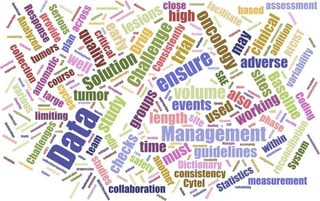Overcoming Data Management Challenges in Oncology Studies

In this blog we’ll highlight some unique challenges that are encountered from a Data Management perspective when working on early phase Oncology trials. We’ll also discuss approaches which can be employed to mitigate these issues.
 Length of time to reach clinical endpoints and trial length variability
Length of time to reach clinical endpoints and trial length variability
Challenge
In early phase oncology studies, patients may continue through various cycles of study treatment until development of disease progression, a dose limiting toxicity or another withdrawal criterion. These multiple cycles imply a high volume of data collection and bring an inherent issue of variability in trial length for the subjects.
Solution: A close collaboration is required between Data Management and Statistics groups during CRF creation to ensure that no duplicate data is being collected. The Clinical Data Manager must also ensure that eCRFs are designed to facilitate accurate and timely data collection. It’s of course critical that data is cleaned consistently throughout the course of the study (through both automatic and manual checks). This means that by the time of an interim or final analysis the data is clean and ready to be analyzed.
Medical Coding of Combination Therapies
Challenge
Chemotherapy treatments are often composed of various drug combinations which are not all catered for by the WHO Drug dictionary.
Solution:
The WHO Drug Dictionary is willing to include new terms on request. The Coding Team should be versed in requesting additions. Planning for up-versioning the study before the lock should be discussed and documented early on in the trial within the Data Management Plan.
High volume of AEs and SAEs
Challenge
There tends to be a large amount of Adverse Events and Serious Adverse Events in these patient populations. Serious adverse event (SAE) data are typically stored in a safety database separate from the clinical trial data, and a reconciliation of the two datasets must be carried out regularly to ensure consistency. The large volume of such data can be overwhelming if a careful plan is not in place.
Solution
When dealing with a larger volume of events, automated SAE reconciliation listings can be implemented either through SAS or another program. In addition, implementing reconciliations more frequently can be helpful. These mitigations help to ensure that essential safety data is reported as intended based on the protocol with no inconsistencies.
Ensuring Data is Captured and Analyzed Consistently Using RECIST
RECIST(Response Evaluation Criteria in Solid Tumors) guidelines were introduced in 2000 to provide a standard for evaluating tumor response, with the goal of maintaining consistency at sites and across sites as well as limiting any site bias. Version 1.1 was released in 2008.
The guidelines provide Baseline instructions for data collection/reporting. At Baseline, tumors lesions will be categorized into measurable and non-measurable, and target and non-target. The lesions must be accurately measured in at least one dimension (longest diameter in the plane of measurement to be recorded).
Challenge
Challenges may occur when it comes to validating lesion measurement and calculating Overall Response, and it’s critical to establish a clear process in order to appropriately reconcile the tumor assessment data.
Solution
The CDM and statistical groups working on the study should have extensive knowledge of these RECIST guidelines. Where possible, the EDC system should be used for automatic edit checks as prompting the sites at the time of entry is beneficial and leads to a higher quality of data. System edit checks can be used to ensure that the method of assessment is consistent across all follow-up tumor assessments based on the data entered at Baseline. An auto calculation may also be used for the sum of lesions to facilitate cleaning and ensure quality of data from the site end.
Click below to watch a video presentation:
The Cytel Data Management team have an average of 8 years’ industry experience each, and many have experience working within an oncology setting. In addition, the close collaboration between Cytel Data Management and Statistics groups adds value for sponsors looking for a high quality biometrics outsourcing solution for their oncology studies.
With thanks to Tim Connolly, Data Manager and Patti Arsenault, Director Clinical Data Management at Cytel
Further Reading
Getting Technical: the evolving role of the Clinical Data Manager
5 key interactions of clinical data management and statistics


